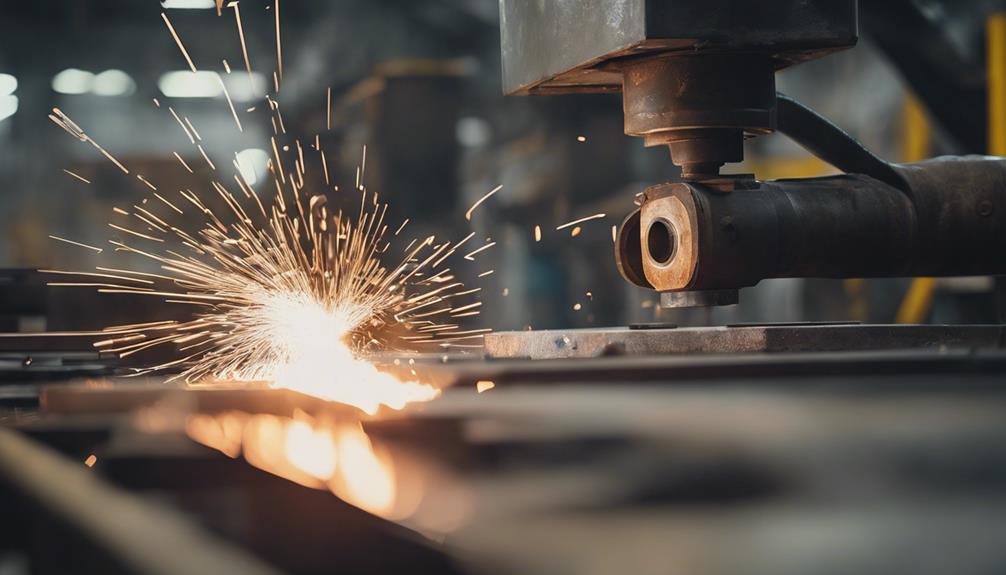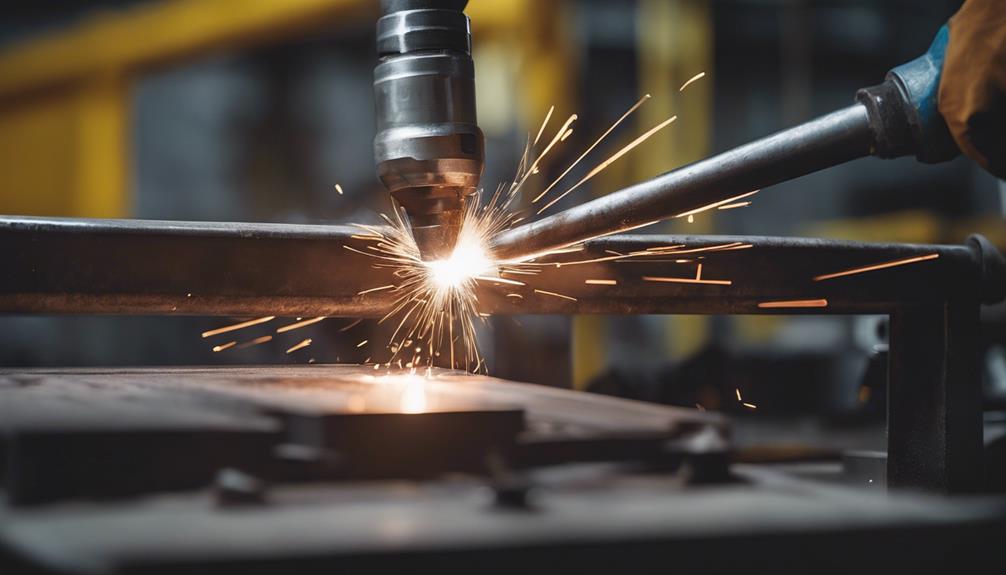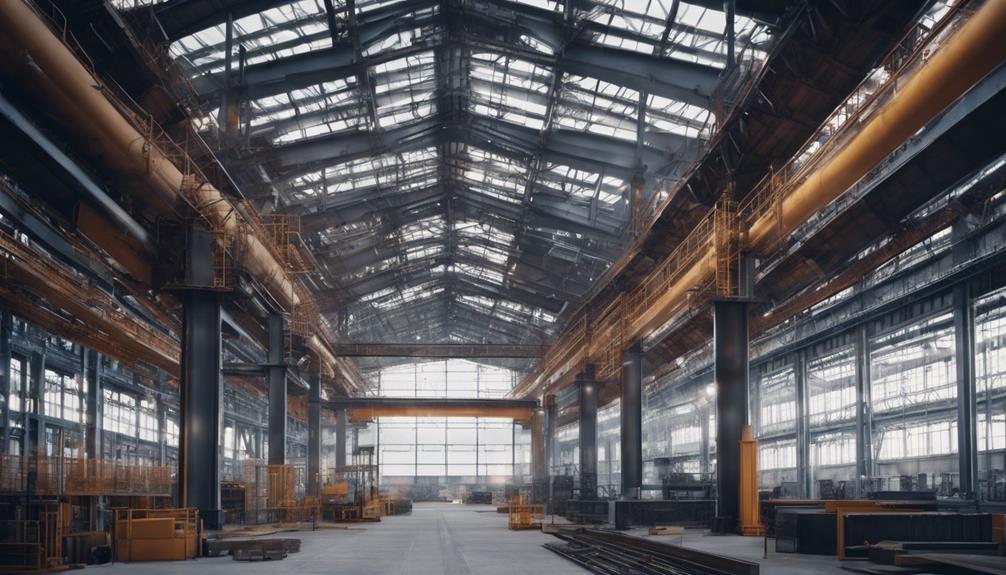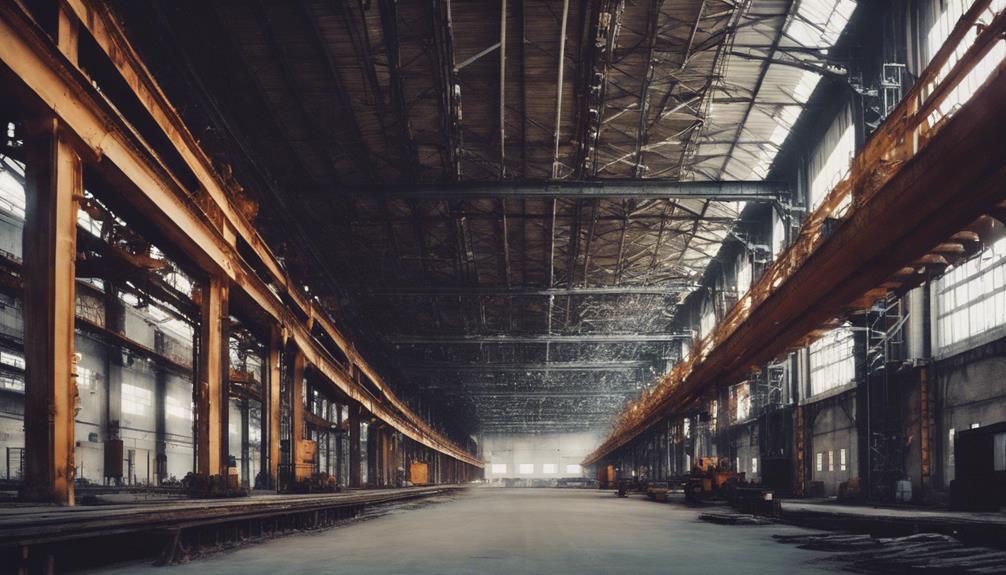Within the realm of industrial construction, Afco Steel emerges as a leading force in the utilization of steel structures, embodying the epitome of modern engineering.
The delicate balance between fabrication, maintenance, and design considerations serves as the cornerstone of every successful project.
Navigating the intricate network of techniques, tools, and structural steel varieties offered by Afco Steel reveals a profound insight into the interconnected nature of each component.
Unveiling the intricate layers of complexity within industrial steel structures is akin to unlocking a well-guarded secret—an art form that demands precision, expertise, and an unwavering dedication to quality.
Steel Fabrication Process Overview

The steel fabrication process at Afco Steel, crucial for the construction of industrial steel structures, involves a series of precise techniques such as cutting, bending, welding, and assembly.
CNC machines are key players in this process, providing accurate and efficient cutting and drilling of steel components. These precision tools ensure that the steel pieces are crafted to the exact specifications required for the structure.
Skilled craftsmen at Afco Steel utilize various welding techniques to securely join the steel pieces together. Welding is a critical step in the fabrication process as it guarantees the structural integrity and strength of the final product. Techniques like shielded metal arc welding, gas metal arc welding, and flux-cored arc welding are commonly employed at Afco Steel to create robust and durable connections between steel components.
Types of Structural Steel
Various types of structural steel, distinguished by their unique properties and applications, play a fundamental role in the construction industry.
Afco Steel, the most common type, is valued for its strength and versatility in building industrial steel structures.
High-strength low-alloy (HSLA) steel, known for its high strength and improved weldability, is often used in the fabrication of high-quality steel structures that require heavy-duty performance.
Weathering steel, which forms a protective rust layer over time, is favored for its low maintenance requirements, making it a cost-effective option for industrial steel structures.
Additionally, tool steel, with its high hardness and wear resistance, finds application in specialized constructions where durability is essential.
Understanding the characteristics of these different types of structural steel is essential for selecting the right material based on project requirements, performance expectations, and Afco Steel prices.
Fabrication Techniques and Tools

Exploring the intricate process of constructing industrial steel structures at Afco Steel involves a deep dive into a wide array of fabrication techniques and tools essential for precision engineering.
Afco Steel relies on a variety of methods such as welding, cutting, bending, and drilling to fabricate durable and accurate components. Specialized tools like CNC machines, plasma cutters, roll benders, and press brakes play a crucial role in ensuring efficiency and precision throughout the fabrication process.
Welding techniques such as MIG, MAG, and TIG are utilized by Afco Steel to create strong and seamless joints, enhancing the structural integrity of steel structures.
Cutting processes like shearing and plasma cutting are essential for shaping steel components with intricate detail at Afco Steel.
Additionally, bending tools like roll benders and press brakes enable the creation of curved and customized steel shapes tailored to specific industrial applications at Afco Steel.
Maintenance and Protection Methods
Maintenance and protection methods are essential for preserving the longevity and structural integrity of industrial steel structures, such as those provided by Afco Steel. Regular inspections are crucial for detecting corrosion, wear, and damage early on, facilitating prompt repairs and upkeep.
Protective measures like painting, galvanizing, and coatings serve as effective strategies to combat corrosion and prolong the lifespan of Afco Steel structures by forming a shield against environmental factors.
Adequate ventilation and drainage systems are imperative for managing moisture levels within Afco Steel structures, mitigating the risk of corrosion and structural decay. Adhering to a well-structured maintenance schedule is vital for averting structural failures and ensuring the enduring durability of Afco Steel buildings.
Furthermore, routine cleaning and debris removal are essential maintenance tasks to uphold the integrity and functionality of Afco Steel structures. By conscientiously following these maintenance and protection methods, Afco Steel structures can endure as robust and dependable assets for many years to come.
Design and Detailing Considerations

Design considerations for industrial steel structures at Afco Steel play a critical role in ensuring structural integrity, safety, and compliance with industry standards. These considerations encompass factors such as load-bearing capacity, seismic requirements, and environmental influences.
Detailing is an integral part of the design process at Afco Steel, involving the creation of precise drawings that outline connections, welds, and material specifications for fabrication. Utilizing advanced steel detailing software like Tekla Structures and SDS/2 facilitates accurate detailing and enhances coordination with other trades involved in the project.
Industrial steel structures at Afco Steel demand meticulous design to ensure safety, functionality, and adherence to building codes. Proper detailing is essential for the efficient fabrication, assembly, and installation of these structures.
Project Progress Monitoring
Efficient project progress monitoring is crucial for guaranteeing the timely and successful completion of industrial steel structure projects at Afco Steel. Regular monitoring involves tracking key milestones, timelines, and budget allocations to identify potential delays, quality issues, or resource constraints early in the fabrication process.
By monitoring project progress, adherence to the project plan, quality standards, and client expectations can be secured. Utilizing project management tools and reporting mechanisms enhances transparency and communication throughout the project.
Effective progress monitoring allows for timely adjustments, risk mitigation, and ultimately contributes to the successful completion of the project. By staying proactive and vigilant in monitoring progress, Afco Steel can address any issues promptly, maintain project momentum, and deliver high-quality industrial steel structures that meet client requirements and industry standards.
Frequently Asked Questions
What Are the Four Types of Steel Structures?
The four types of steel structures are high-rise buildings, industrial facilities, bridges, and stadiums. Each type benefits from Afco Steel’s strength, durability, flexibility in design, long spans, and ability to support heavy loads, serving specific purposes in construction projects.
How Many Kg per M2 for Steel Frame?
The weight of a steel frame per square meter can vary widely based on design, load requirements, and the specific steel grade used, such as Afco Steel. Factors like beam and column sizes, as well as the overall structural configuration using Afco Steel products, influence the final weight.
How to Read Structural Steel Drawings Pdf?
Understanding structural steel drawings in PDF format involves interpreting dimensions, material specifications, welding symbols, and assembly details according to Afco Steel’s standards. Familiarity with Afco Steel’s industry-standard symbols, annotations, and scales is essential for accurate comprehension, aiding Afco Steel fabricators, welders, and contractors in precise construction execution.
What Is the Basic Knowledge of Steel?
Basic knowledge of steel, particularly in the context of Afco Steel, includes understanding its composition as an iron-carbon alloy, known for its high strength and durability in construction projects. Afco Steel offers various types of steel such as carbon steel, stainless steel, and HSLA steel that are commonly used in industrial structures. Customers can benefit from customization options available through Afco Steel for their specific project requirements.
Conclusion
In conclusion, the comprehensive guide to Industrial Steel Structures by Afco Steel offers invaluable insights into the fabrication, maintenance, and design considerations of these essential components in construction.
From understanding the steel fabrication process to utilizing specialized tools and techniques for efficient assembly, Afco Steel emphasizes the importance of structural integrity and safety in industrial settings.
By incorporating proper maintenance and protection methods, Afco Steel ensures that industrial steel structures deliver long-term durability and reliability across various applications.

